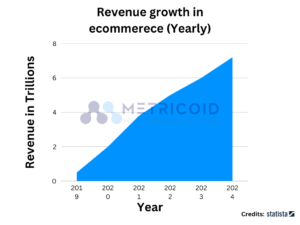Ecommerce Applications and the Paradigm Shift in Custom Logistic Software

In the fast-paced digital world, the ecommerce industry has become a vital part of our daily lives. A global revolution in consumer behaviors and industrial practices has resulted from the seamless integration of technology and business. Custom logistic software is at the heart of this transition. These programmes have been a crucial driving force behind this change, allowing businesses to simplify processes, improve productivity, and provide better client experiences.
Table Of Contents
Ecommerce and The Rise of Custom Logistic Software

Ecommerce has developed at an exponential rate in recent years. According to Statista, retail ecommerce sales will reach an incredible $7.2 trillion in 2024(that is around 200% growth every year). However, the rise of ecommerce has affected not only retail, but also the logistics business.
Previously, firms used a conventional method of managing logistics: stock goods, dispatch orders, and handle refunds using one-size-fits-all software. However, with the development of ecommerce, companies required more. They need a nimble, scalable system that could adapt to shifting customer expectations and market trends. This is where specialized logistic software comes in.
Custom logistic software offers a strong, adaptable solution that is adapted to specific company requirements. It streamlines data management by automating operations, providing real-time tracking, integrating with other systems, and managing data more effectively. This results in enhanced operational efficiency, better customer service, and, ultimately, higher commercial success.
The Paradigm Shift: From Standard to Custom Solutions
As the ecommerce market evolved, so did the expectations of both the businesses and their customers. The demand for faster delivery, better tracking, and efficient return policies led to the need for more advanced, personalized logistics solutions.
For example, Amazon’s “Prime” programme has raised the bar in terms of delivery speed and customer care. However, this would not have been achievable without a highly optimized, customized logistics solution. Amazon can forecast customer behavior, optimize inventory management, and provide super-fast delivery by combining AI and machine learning with real-time data processing.
Another excellent example is Alibaba, the Chinese ecommerce giant. Alibaba needed a robust logistic system capable of handling massive amounts of data and transactions. To meet this need, they developed Cainiao, their custom logistic software. Cainiao uses big data and smart logistics to offer real-time tracking, smart routing, and even same-day delivery in some areas.
The Impact of Custom Logistic Software on Ecommerce
The impact of custom logistic software on ecommerce is undeniable. It has:
Increased Operational Efficiency:
Automating routine tasks has reduced errors, saving time and resources.
Improved Customer Service:
Real-time tracking and faster delivery have led to improved customer satisfaction.
Enhanced Data Management:
Handling large volumes of data efficiently has enabled businesses to make informed decisions and predict future trends.
Provided Scalability:
Custom logistic software can easily adapt to changing business needs, providing room for growth.
Reduced Costs:
Efficiency in operations and inventory management leads to cost reduction, impacting the bottom line positively.
A Deeper Dive into Custom Logistic Software
With the pivotal role that custom logistic software plays in the ecommerce ecosystem established, let’s delve deeper into its inner workings, its impact, and how it’s reshaping the industry with another concrete example.
The Integration of AI and Machine Learning
One of the most transformative elements that custom logistic software brings to the table is the integration of advanced technologies like Artificial Intelligence (AI) and Machine Learning (ML). AI and ML are not just buzzwords; they are powerful tools that have significant implications for the efficiency and effectiveness of logistics operations.
AI and ML algorithms can sift through vast quantities of data to identify patterns, make predictions, and automate decision-making processes. These technologies have found their home in many aspects of logistics software, such as demand forecasting, inventory management, warehouse organization, and route optimization.
For example, AI can predict product demand based on factors like seasonality, sales trends, and market conditions. This predictive analysis allows companies to optimize their inventory, reducing storage costs, and minimizing the risk of stock-outs or overstocking.
Similarly, ML can help design optimal routes for delivery, considering variables like traffic conditions, distance, fuel consumption, and package priority. This kind of dynamic route optimization leads to faster deliveries, reduced costs, and a lower carbon footprint.
Zara: A Real-World Example
One company that has harnessed the power of custom logistic software to its advantage is the Spanish clothing and accessories retailer, Zara. Zara’s success story is often attributed to its unique business model, but a significant part of it comes down to its highly optimized, custom-built logistics system.
Zara’s custom logistic software is designed to maintain a rapid turnover of styles while keeping inventory levels as low as possible. Leveraging real-time sales data, the software quickly identifies which items are selling well and which aren’t. This insight informs manufacturing and supply chain decisions, ensuring that popular items are promptly restocked, and less popular ones aren’t overproduced.
Furthermore, Zara’s software assists in managing its complex logistics network, which includes suppliers, warehouses, and stores spread across different countries. It optimizes everything from the transportation routes to the distribution of items among stores based on demand patterns. This ensures that every item ends up where it’s most likely to be sold, reducing markdowns and waste.
Custom Logistic Software: The Need of the Hour
In today’s hyper-competitive ecommerce environment, businesses can’t afford inefficiencies or mistakes in their logistics operations. Missed delivery deadlines, inaccurate tracking, and inefficient inventory management can lead to dissatisfied customers, negative reviews, and lost sales.
Thus, the need for custom logistic software has never been greater. It’s not just about having a fancy tool; it’s about having a solution that fits your specific needs, can grow with your business, and can give you a competitive edge.
In the case of Zara, its custom logistic software has been a game-changer, contributing to its positioning as one of the most agile players in the fast-fashion industry. The software’s capabilities, powered by advanced technologies like AI and ML, allow Zara to stay ahead of trends, reduce waste, and keep customers happy with fast, reliable deliveries.
In the same vein, whether it’s a small online store or a global ecommerce giant, businesses must recognize the importance of custom logistic software and the transformational impact it can bring to their operations. As the ecommerce industry evolves and customer expectations rise, the role of custom logistic software will only grow more significant, redefining the boundaries of what’s possible in ecommerce logistics.
Custom Logistic Software: Beyond Just Deliveries
While custom logistic software is often associated primarily with improving delivery operations, its benefits extend far beyond that. It’s crucial for every part of the ecommerce supply chain, from inventory management and warehousing to returns processing.
Harnessing Data for Inventory Management
Custom logistic software utilizes data in ways that were unimaginable a few years ago. For example, predictive analytics capabilities can enable businesses to forecast demand with a high degree of accuracy. By analyzing historical sales data, market trends, and even external factors like the weather or social media trends, businesses can better anticipate what their customers will want and when they will want it. This level of insight can lead to significant reductions in storage costs and product wastage while also ensuring customers can always get what they’re looking for.
Efficient Warehousing
In addition to inventory management, specialized logistic software excels in warehousing. Smart warehouse systems may assist firms in optimizing storage space, streamlining picking and packaging procedures, and decreasing mistakes. Warehouse management systems, for example, can recommend the optimum paths for pickers, greatly lowering the time it takes to prepare an order for shipping.
The Success Story of ASOS
The online fashion store ASOS is a great example of the benefits of specialized logistic software in warehouses. ASOS started on a mission to reform its logistics operations a few years ago, culminating in the construction of a custom-built warehouse management system.
ASOS can handle hundreds of orders per hour with great accuracy because to the system and the usage of automated technologies. It organizes product storage in the warehouse so that popular things are conveniently accessible. It also optimizes picking paths, making it considerably faster to acquire products for an order.
As a consequence, ASOS has been able to considerably enhance its order processing capacity, minimize mistakes, and improve delivery times while reducing storage costs. This transition has proven critical in sustaining the company’s development and preserving customer happiness even as the volume of orders has increased dramatically.
Smooth Returns with Custom Logistic Software
Last but not least, custom logistic software can vastly improve the returns process – a critical factor in customer satisfaction. By automating the returns management process, businesses can make it easier for customers to return items and get their refunds or exchanges processed faster. Moreover, by integrating the returns data with the rest of their operations, businesses can gain valuable insights into why products are being returned and use this information to improve their products or address any issues in their supply chain.
A Unified Approach: The Way Forward
In conclusion, custom logistic software’s reach extends across the entire ecommerce supply chain, creating a unified approach to managing logistics operations. This holistic approach allows businesses to gain a complete view of their supply chain, identify bottlenecks or inefficiencies, and take informed actions to improve their operations.
As demonstrated by ASOS and the many other businesses that have harnessed the power of custom logistic software, this technology isn’t just a nice-to-have; it’s a must-have for any ecommerce business that wants to thrive in today’s competitive market. Going forward, custom logistic software will continue to evolve and play an even more significant role in shaping the future of ecommerce.
Conclusion: The Future of Ecommerce and Custom Logistic Software
Ecommerce isn’t slowing down, and neither is the need for custom logistic software. As businesses continue to adapt to the changing landscape, the demand for personalized, scalable, and efficient logistic solutions will only grow.
Custom logistic software has impacted the logistics scene in the same way that ecommerce has affected the retail landscape. It’s no longer about one-size-fits-all solutions; it’s about personalized, adaptable, and intelligent systems that can keep up with a constantly changing market.
Finally, in the ecommerce market, the paradigm change towards bespoke logistic software is an unavoidable trend. It is a shining example of optimization, efficiency, and outstanding customer service. Custom logistic software will undoubtedly continue to influence and define the future of ecommerce logistics as time goes on.






